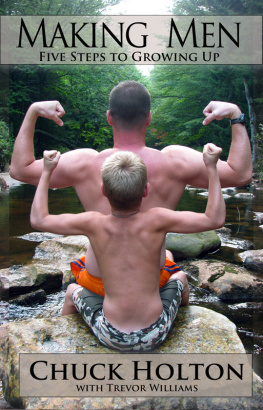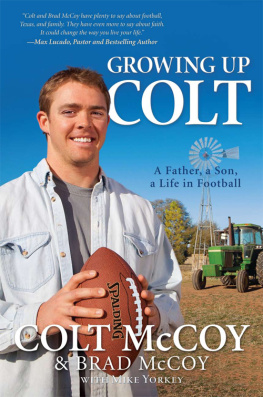

HARVEST HOUSE PUBLISHERS
EUGENE, OREGON
All Scripture quotations are taken from the New American Standard Bible, 1960, 1962, 1963, 1968, 1971, 1972, 1973, 1975, 1977, 1995 by The Lockman Foundation. Used by permission. (www.Lockman.org)
Cover by Koechel Peterson & Associates, Inc., Minneapolis, Minnesota
Cover photoiStockphoto/Thinkstock
Back cover author photo by Krystal Mann
Published in association with Patti M. Hummel, President/Agent, Benchmark Group LLC, Nashville, TN. benchmarkgroup1@aol.com.
WHAT EVERY MAN WISHES HIS FATHER HAD TOLD HIM
Copyright 2012 by Byron Forrest Yawn
Published by Harvest House Publishers
Eugene, Oregon 97402
www.harvesthousepublishers.com
Library of Congress Cataloging-in-Publication Data
Yawn, Byron Forrest.
What every man wishes his father had told him / Byron Forrest Yawn.
p. cm.
ISBN 978-0-7369-4638-4 (pbk.)
ISBN 978-0-7369-4640-7 (eBook)
1. Christian menReligious life. I. Title.
BV4528.2.Y39 2012
248.8'42dc23
2011021194
All rights reserved. No part of this publication may be reproduced, stored in a retrieval system, or transmitted in any form or by any meanselectronic, mechanical, digital, photocopy, recording, or any otherexcept for brief quotations in printed reviews, without the prior permission of the publisher.
Printed in the United States of America
12 13 14 15 16 17 18 19 20 / BP-SK / 10 9 8 7 6 5 4 3 2 1
To my sons Wade, Zachary, and Blake
and
my beloved father, Dr. Victor Wade Yawn II
Post Tenebrus Lux
C ONTENTS
 n ancient biblical cultures it was understood that every father had a solemn duty to help usher his sons into manhood. He fulfilled that role by teaching them wisdom, instructing them in the facts of life, preparing them for the disciplines of adulthood, and indoctrinating them in the way of truth and righteousness. That kind of fatherly training is exemplified in the Old Testament book of Proverbspaternal and spiritual wisdom preserved for us in pithy, memorable statements that are easy to digest, powerfully practical, and profoundly wise.
n ancient biblical cultures it was understood that every father had a solemn duty to help usher his sons into manhood. He fulfilled that role by teaching them wisdom, instructing them in the facts of life, preparing them for the disciplines of adulthood, and indoctrinating them in the way of truth and righteousness. That kind of fatherly training is exemplified in the Old Testament book of Proverbspaternal and spiritual wisdom preserved for us in pithy, memorable statements that are easy to digest, powerfully practical, and profoundly wise.
Children in those days entered adulthood and were expected to assume grown-up responsibilities at a much younger age than contemporary Western cultures have grown accustomed to. There was no concept of adolescencethat troublesome phase of drawn-out immaturity and rebellion todays young people are expected to splash around in for several years following puberty. In biblical times, adulthood came early. That pattern is reflected in the Jewish celebration of Bar Mitzvah at age 13, when boys become sons of commandment and are formally recognized as having come of age. The same approach is also seen in the maturing of Christ into manhood. The only record of Jesus teenage years is a single verse, telling us that He kept increasing in wisdom and in stature, and in favor with God and man (Luke 2:52). He personified steady growth into manhood; He was not hindered or diverted from that goal by any of the typical distractions of youth.
In stark contrast to the biblical pattern, young men in our culture today begin to manifest adolescent characteristics (such as rebellion, depression, and chronic cynicism) earlier than everand they remain immature longer than ever. Some, it seems, never do become true men. In fact, many become fathers without ever really becoming adults.
No wonder. Permanent adolescence is relentlessly romanticized and shamelessly encouraged in practically all popular entertainment and advertising. Manhood itself is often strongly discouraged, while societys fundamental values are systematically being feminized. Trends such as those have given rise to an epidemic of fatherless homes and irresponsible thirty-something males. Countless young men are addicted to entertainment, living in a culture already shaped to a very large degree by movies, video games, and fantasy role-playing. It is frankly no surprise that real men are in such scarce supply. Never has there been a more urgent need for wise and diligent fathers.
Many people have noticed these cultural shifts, of course, including some Christian leaders. Evangelical attempts to address the decline of manhood have gone to two extremesone side encouraging the church to embrace feminist values; the other side promoting a radically cartoonish caricature of manhood. (One wildly popular approach encourages Christian men to treat fantasy characters as role models.) The fact that evangelical leaders and best-selling authors would put such unbiblical suggestions on the table is of course part of the problem.
Byron Yawn has a much better suggestion. It starts with listening to what the Bible says about manhoodletting Scripture shape our value system, our view of masculinity, and our lifestyles as true men and true disciples of Christ. Specifically, Pastor Yawn points out that the quintessential model of perfect manhood is not a fictional character from a gladiator movie; not a soft, epicene trendoid with exaggerated postmodern sensitivities; and not a bullying tyrant who mistakes intimidation for authority. The archetype and epitome of everything a mature man should be is Jesus Christ.
Thats precisely what Ephesians 4:13 says: The measure of a mature man is the stature which belongs to the fullness of Christ. Thats also the theme and central lesson of this book.
Pastor Yawn has done a considerable amount of careful thinking about manhood as it is portrayed in Scripture. He writes poignantly, straightforwardly, compellingly about what it means to be a man, about how fathers can train their sons to be true men, and about how sons can honor their fathers in a manly fashion. This is a refreshing, challenging, engaging, and (best of all) biblical study of a subject that has too often been overlooked, handled badly, or looked at through the lens of cultural rather than biblical values. Byron Yawn makes none of those mistakes. The result is a book that will be treasured by fathers and sons alike.

Dad, you and I are just alike, except for the nose hairs.
{B LAKE A LEXANDER Y AWN }
He said, Take now your son, your only son, whom you love, Isaac,
and go to the land of Moriah; and offer him there as a burnt offering on
one of the mountains of which I will tell you.
So Abraham rose early in the morning and saddled his donkey
{G ENESIS 22:2-3}
 his book strikes out in three simultaneous directions. First, it heads backward to a place just before the dawn of time in a young boys life. A point of innocence and nostalgia complete with action figures (not figurines), baseball mitts, and plastic guns. The very moment when someoneotherwise known as dadshould have stepped in and started preparing that young man for the mind-bending realities dead ahead. For many, if not most of us, this was a season of missed opportunity. What we struggled to figure out at twenty-eight could have been generally explained at eight. It would have taken only a few minutes of time to condescend to a boys level and show him the way. At least we could have seen it coming when it ran us over.
his book strikes out in three simultaneous directions. First, it heads backward to a place just before the dawn of time in a young boys life. A point of innocence and nostalgia complete with action figures (not figurines), baseball mitts, and plastic guns. The very moment when someoneotherwise known as dadshould have stepped in and started preparing that young man for the mind-bending realities dead ahead. For many, if not most of us, this was a season of missed opportunity. What we struggled to figure out at twenty-eight could have been generally explained at eight. It would have taken only a few minutes of time to condescend to a boys level and show him the way. At least we could have seen it coming when it ran us over.
Next page












 n ancient biblical cultures it was understood that every father had a solemn duty to help usher his sons into manhood. He fulfilled that role by teaching them wisdom, instructing them in the facts of life, preparing them for the disciplines of adulthood, and indoctrinating them in the way of truth and righteousness. That kind of fatherly training is exemplified in the Old Testament book of Proverbspaternal and spiritual wisdom preserved for us in pithy, memorable statements that are easy to digest, powerfully practical, and profoundly wise.
n ancient biblical cultures it was understood that every father had a solemn duty to help usher his sons into manhood. He fulfilled that role by teaching them wisdom, instructing them in the facts of life, preparing them for the disciplines of adulthood, and indoctrinating them in the way of truth and righteousness. That kind of fatherly training is exemplified in the Old Testament book of Proverbspaternal and spiritual wisdom preserved for us in pithy, memorable statements that are easy to digest, powerfully practical, and profoundly wise.
 his book strikes out in three simultaneous directions. First, it heads backward to a place just before the dawn of time in a young boys life. A point of innocence and nostalgia complete with action figures (not figurines), baseball mitts, and plastic guns. The very moment when someoneotherwise known as dadshould have stepped in and started preparing that young man for the mind-bending realities dead ahead. For many, if not most of us, this was a season of missed opportunity. What we struggled to figure out at twenty-eight could have been generally explained at eight. It would have taken only a few minutes of time to condescend to a boys level and show him the way. At least we could have seen it coming when it ran us over.
his book strikes out in three simultaneous directions. First, it heads backward to a place just before the dawn of time in a young boys life. A point of innocence and nostalgia complete with action figures (not figurines), baseball mitts, and plastic guns. The very moment when someoneotherwise known as dadshould have stepped in and started preparing that young man for the mind-bending realities dead ahead. For many, if not most of us, this was a season of missed opportunity. What we struggled to figure out at twenty-eight could have been generally explained at eight. It would have taken only a few minutes of time to condescend to a boys level and show him the way. At least we could have seen it coming when it ran us over.